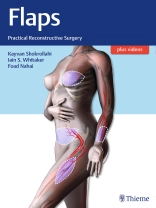FIVE STARS from Doody’s Star Ratings™
A step-by-step manual on the use of reconstructive surgery flaps – from planning to execution
Written by pioneering, world renowned flap surgeons, this is the quintessential manual on the use of reconstructive flaps – with detailed, easy-to-follow instructions. Overview chapters on each major anatomical area provide a general approach to reconstruction, with detailed tutorials on workhorse flaps in the A to Z section. The didactic text is enhanced with high quality operative photographs, illustrations, and videos, resulting in a resource that enables integration of these techniques into surgical practice.
Key Highlights
- Progressive intraoperative photos and superb illustrations guide the reader through safe and efficacious flap approaches
- Planning and decision-making chapters cover basic principles, microsurgery, imaging, and an overview of current options
- Flaps section details the multivariate usages of microsurgical flaps, pedicled flaps, perforator flaps, and more
- Videos focus on the anatomy and basic principles of technique for a range of common flaps further delineating and simplifying flap surgery for the practitioner
- The Masterclasses section is packed with state of the art innovations, personal experience, and insights on managing challenging reconstructions
This book is a stellar, step-by-step guide on the reconstruction of most anatomical defects using clinically proven flaps. It is an essential reference for practicing and trainee surgeons in general and specialized surgical disciplines. Plastic and reconstructive, trauma/burn, orthopaedic, otolaryngology-head and neck, and maxillofacial surgeons will greatly benefit from this comprehensive resource.
Published with a free e-book.
Spis treści
<strong>Section I. Planning and Decision Making in Reconstructive Surgery</strong><br>Chapter 1 Basic Principles of Reconstructive Surgery and Flaps<br>Chapter 2 Microsurgery<br>Chapter 3 Preoperative Imaging for Reconstructive Flap Planning<br>Chapter 4 Current Options for Breast Reconstruction Following Mastectomy<br>Chapter 5 Current Options for Perineal Reconstruction<br>Chapter 6 Current Options for Head and Neck Reconstruction<br>Chapter 7 Current Options for Lower Limb Reconstruction<br>Chapter 8 Recipient Vessels for Microsurgery<br>Chapter 9 The Internal Mammary System as Recipient Vessels for Breast Microsurgical Reconstruction<br>Chapter 10 The Thoracodorsal System as Recipient Vessels for Breast Microsurgical Reconstruction<br>Chapter 11 Postoperative Monitoring of Microvascular Free Flaps<br><strong>Section II. Reconstructive Flaps A-to-Z</strong><br>Chapter 12 Anterolateral Thigh Free Flaps<br>Chapter 13 Anterolateral Thigh Pedicled Flaps<br>Chapter 14 Deep Circumflex Iliac Artery Flaps<br>Chapter 15 Deep Inferior Epigastric Artery Perforator Flaps and Superficial Inferior Epigastric Artery Flaps for Breast Reconstruction<br>Chapter 16 Deltopectoral Flaps for Head and Neck Reconstruction<br>Chapter 17 Fibula Osteoseptocutaneous Flaps<br>Chapter 18 Gastrocnemius Muscle Flaps for Lower Limb Reconstruction<br>Chapter 19 Gracilis Muscle and Myocutaneous Flaps<br>Chapter 20 Groin and Superficial Circumflex Iliac Perforator Flaps<br>Chapter 21 Inferior Gluteal Artery Musculocutaneous Flaps<br>Chapter 22 Jejunal Flap Reconstruction for Circumferential Pharyngolaryngectomy Defects<br>Chapter 23 Design, Principles, and Variations of Keystone Flaps<br>Chapter 24 Keystone Flaps for Lower Limb Reconstruction<br>Chapter 25 Keystone Flaps for Reconstruction in the Trunk<br>Chapter 26 Keystone Flaps for Reconstruction in the Upper Limb<br>Chapter 27 Keystone Flap Principles, Technique, and Variations in Head and Neck Surgery<br>Chapter 28 Lateral Arm Free Flaps for Head and Neck Reconstruction<br>Chapter 29 Latissimus Dorsi Free Flaps<br>Chapter 30 Latissimus Dorsi Pedicled Flaps<br>Chapter 31 Pedicled Omental Flaps for Sternal Reconstruction<br>Chapter 32 Pectoralis Major Muscle Flaps<br>Chapter 33 Pectoralis Major Myocutaneous Flaps<br>Chapter 34 Gluteal Thigh Flaps<br>Chapter 35 Posterior Thigh Perforator Flaps<br>Chapter 36 Radial Forearm Fasciocutaneous Flaps<br>Chapter 37 Rectus Abdominis Muscle Flaps<br>Chapter 38 Rectus Femoris Muscle Flaps<br>Chapter 39 Scapular Flaps, Parascapular Flaps, Circumflex Scapular Artery Perforator Flaps, and Scapular Osteocutaneous Flaps<br>Chapter 40 Superior Gluteal Artery Perforator Flaps<br>Chapter 41 Soleus Flaps<br>Chapter 42 Reverse Sural Flaps<br>Chapter 43 Thoracodorsal Artery Perforator Flaps<br>Chapter 44 Tensor Fascia Lata Perforator-Based Island Flaps<br>Chapter 45 Transverse Myocutaneous Gracilis Free Flaps<br>Chapter 46 Temporoparietal Fascia Flaps<br>Chapter 47 Pedicled Transverse Rectus Abdominis Myocutaneous Flaps<br>Chapter 48 Free Transverse Rectus Abdominis Musculocutaneous Flaps for Breast Reconstruction<br>Chapter 49 Trapezius Flaps<br>Chapter 50 Ulnar Artery Forearm Fasciocutaneous Flaps<br>Chapter 51 Vertical or Oblique Rectus Abdominis Myocutaneous Flaps for Perineal Reconstruction<br><strong>Section III. Masterclasses in Reconstructive Flaps</strong><br>Chapter 52 Meeting the Aesthetic Challenges of Complex Facial Reconstructions<br>Chapter 53 Nasal Reconstruction<br>Chapter 54 Facial Alloflaps for Face Transplantation<br>Chapter 55 Facial Artery Perforator Flaps for Perioral Soft Tissue Defects<br>Chapter 56 Facial Artery Musculomucosal Flaps<br>Chapter 57 Parascapular Cutaneous Axial Flaps<br>Chapter 58 Radial Forearm Flaps<br>Chapter 59 Dorsalis Pedis Flaps<br>Chapter 60 Understanding the Rhomboid Flap: The 20-Degree Rule<br>Chapter 61 Quaba Flaps<br>Chapter 62 Spinal Reconstruction with Free Vascularized Bone Flaps<br>Chapter 63 Muscle-Sparing Latissimus Dorsi Flaps<br>Chapter 64 Reconstruction of Full-Thickness Oromandibular Defects<br>Chapter 65 Principles of Flap Reconstruction for Burns<br>Chapter 66 Local Perforator Flap Reconstruction in the Surgical Mission Setting<br>Chapter 67 Peroneus Brevis Muscle Flaps for Lower Limb Reconstruction in Burns or Trauma</p>












